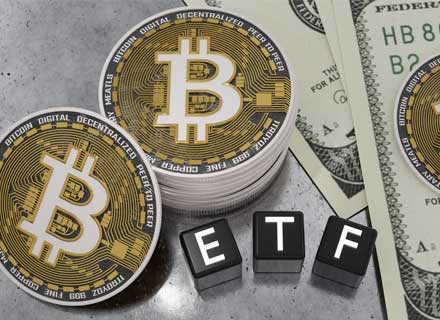Bitcoin futures Exchange Traded Funds (ETFs), which are basically pools of bitcoin-related assets offered on traditional exchanges by brokerages to be traded as ETFs (with the intent of giving retail and other investors exposure to cryptocurrencies without needing to own them) have become the new craze in Wall Street.
Hudson River Trading, Virtu Financial, Jane Street and Jump Trading have entered into discussions with the American multinational investment company BlackRock on providing liquidity for the latter’s anticipated Bitcoin exchange-traded fund (ETF), which is awaiting regulatory approval.
Another asset management giant VanEck has joined the ETF craze by reportedly updating its Bitcoin spot Exchange Traded Fund (ETF) filing with the Securities and Exchange Commission (SEC).
VanEck, which offers tailored investment products to a wide range of client bases, has now recognised the need for a regulated and secure way to offer Bitcoin exposure to investors.
Bitwise and Fidelity Investments are also making moves in the Bitcoin ETF territory, realising the tool’s game-changing prospect in 21st century investment portfolios.
Digital asset manager Valkyrie Investments has now amended its spot Bitcoin Exchange Traded Fund (ETF) filing with United States securities regulators. The venture is now aiming to offer investors an opportunity to invest in Bitcoin-backed common shares.
Global investment firm Franklin Templeton, which has approximately USD 1.45 trillion worth of assets under management, has also filed for a spot bitcoin Exchange Traded Fund (ETF) with the SEC.
Not Everyone Is Joining The Race
Despite the rising optimism around the Bitcoin ETF, Vanguard CEO Tim Buckley told CNBC that his venture had no plans to follow suit.
“We won’t be pursuing a Bitcoin ETF. It’s just like we don’t use gold as an asset class for our clients. It’s not that people can’t invest in there. We just look at asset classes or, you know, what belongs in a long-term portfolio, what has intrinsic value, has cash flows to it? And those are the asset classes we steer people towards. And so we don’t go towards bitcoin or gold or any other of those stable assets,” the official remarked further.
The SEC Contention
While the SEC is allowing bitcoin futures ETFs, it has been critical of the cryptocurrency part around the project.
However, in August 2023, Grayscale Investments won its court case against the SEC, which had earlier rejected an application to turn the American digital currency asset management company’s over-the-counter traded bitcoin trust into an ETF.
The SEC, which has consistently expressed concerns about potential market manipulation and investor protection in the crypto market, was asked by a Federal Court to reconsider the stance as the latter reportedly emphasised the similarities between Grayscale’s proposal and the already approved Bitcoin futures ETFs.
Investment research firm Galaxy Digital sees Bitcoin ETFs attract over USD 14 billion in assets within the first year of approval, with this figure potentially rising to USD 39 billion by the third year.
In October 2023, crypto-bull Mike Novogratz told CNBC that it would make zero sense for an ETF to be blocked, as inflows into digital asset funds reportedly jumped to their highest weekly level since July 2022.

